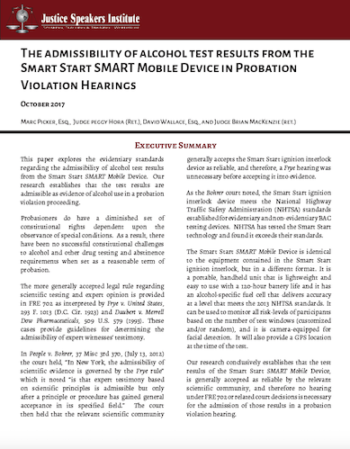Admissibility of Smart Start SMART Mobile Device in Probation Hearings
This paper reviews the evidentiary standards for alcohol test results from the Smart Start SMART Mobile Device in probation violation cases. Research confirms these results are reliable and meet admissibility requirements for evidence of alcohol use.
Probationers’ rights allow for alcohol testing as a reasonable condition of supervision, upheld by courts under FRE 702and decisions like Frye v. United States (1923) and Daubert v. Merrell Dow Pharmaceuticals (1993).
In People v. Bohrer, the court determined that the Smart Start ignition interlock device is reliable under Frye, which requires general scientific acceptance. The Smart Start SMART Mobile Device, using the same technology, meets National Highway Traffic Safety Administration (NHTSA) standards for evidentiary BAC testing.
This portable device is lightweight, with a 120-hour battery, GPS tracking, and facial detection. Its alcohol-specific fuel cell ensures high accuracy, meeting 2013 NHTSA standards.
The Smart Start SMART Mobile Device is widely accepted as reliable in the scientific community. Courts do not require FRE 702 hearings for its results to be admissible, making it an effective tool for monitoring probation compliance.
- CLIENT Smart Start
- YEAR 2017
- WE DID Write, edit, design and publish
- CATEGORY Position Papers , Publications


